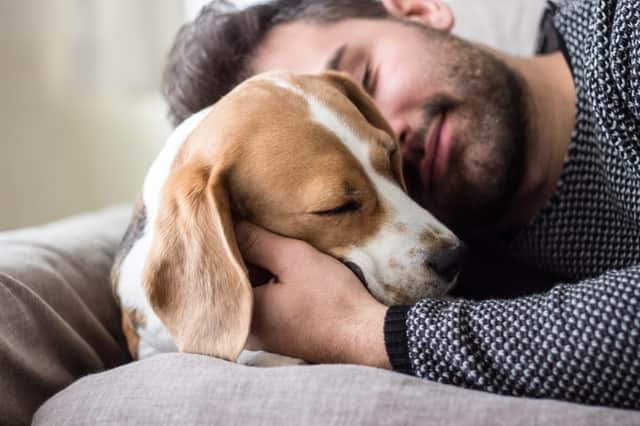Symptoms of coronavirus in cats and dogs - and can they catch and carry the virus


Covid is common in pet cats and dogs whose owners have the disease, new research suggests.
But how likely is it for dogs and cats to catch Covid and what are the signs and symptoms your pet has the virus?
Here’s what you need to know.
Can pets get Covid?
Advertisement
Hide AdAdvertisement
Hide AdNew research has suggested that Covid is common in pet cats and dogs whose owners have the disease.
Researchers from Utrecht University sent a mobile veterinary clinic to households in the Netherlands that had tested positive for Covid at some point in the past 200 days.
Swabs were then taken from cats and dogs in the households to test for evidence of a current infection.
Blood samples were also tested for antibodies suggesting a past exposure to Covid-19
Advertisement
Hide AdSwabs were taken from 310 pets in 196 households where a human infection had been detected, with six cats and seven dogs returning a positive PCR result and 54 animals testing positive for virus antibodies.
Advertisement
Hide AdThe authors of the study said no evidence of pet-to-owner transmission had been recorded to date.
However, researchers also said this would be difficult to detect while coronavirus was still spreading easily between humans.
What should I do if I have Covid?
Researchers from the study have said that if you have Covid-19 then you should avoid contact with your pet where possible.
Advertisement
Hide AdDr Els Broens, from Utrecht University, said: "If you have Covid, you should avoid contact with your cat or dog, just as you would do with other people.
"The main concern is not the animals' health but the potential risk that pets could act as a reservoir of the virus and reintroduce it into the human population.
Advertisement
Hide Ad"Fortunately, to date no pet-to-human transmission has been reported.
"So, despite the rather high prevalence among pets from COVID-19 positive households in this study, it seems unlikely that pets play a role in the pandemic."
Advertisement
Hide AdMost infected pets were found to be asymptomatic or displayed mild Covid symptoms.
Eight cats and dogs that lived in the same homes as the pets that tested positive for the virus were also swabbed for a second time to check for transmission of the virus among pets, but none tested positive.
This suggested that the virus was not being passed between pets living in close contact with one another.
In line with public health guidance, you should:
Advertisement
Hide Adwash your hands before and after any contact with your pet, its food or beddingnot share food with your pet
Advertisement
Hide AdThere is currently no evidence that you need to wash your pets to control the spread of COVID-19, according to the Department for Environment, Food & Rural Affairs (Defra) and the Animal and Plant Health Agency.
“If you’re concerned about your pet because it has respiratory or digestive problems and a temperature, you should contact your vet who will decide whether testing is required,” said Defra and the Animal and Plant Health Agency.
What are the symptoms of Covid in pets?
According to the PDSA, “most of the small number of animals that have tested positive for Covid-19 have either not had symptoms, or only suffered very mild symptoms.” These include:
- Coughing- Sneezing- A runny nose- Weepy eyes- Vomiting or diarrhoea- Mild breathing difficulties- High temperature- Reduced appetite
You should contact your vet for advice if your pet has any of these symptoms, but also keep in mind that these are all common symptoms and unlikely to be Covid-19 related.